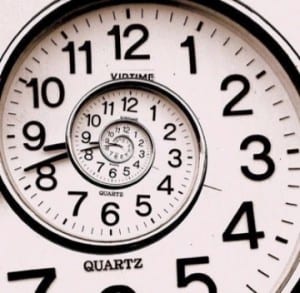“I must govern the clock, not be governed by it”
This is a statement from Golda Meir, a Prime Minister of Israel about how life has so much to offer us and we have so little time if we work to keep in time with the clock. Instead, we should embrace what we want to do, when we want to do it and dictate to the clock how fast or slow we want time to go. Clocks are a man-made object that were created in order to structure a day according to the sunlight so this poses the question Does time really exist? We were born and educated to recognise that time exists in our lives and this is passively accepted by everyone so we unconsciously live in the control of time.
 Our performance has a main focus around clocks and time which is why I found this a particularly interesting concept to consider. We are controlled by the sound of a ticking clock and move in time with this through our condensed working day. This is emphasising the way in which people can become consumed with their daily routines and captured in mundane repetition every day because they are focused on keeping up with time.
Our performance has a main focus around clocks and time which is why I found this a particularly interesting concept to consider. We are controlled by the sound of a ticking clock and move in time with this through our condensed working day. This is emphasising the way in which people can become consumed with their daily routines and captured in mundane repetition every day because they are focused on keeping up with time.
In reality, we go through the day doing the things we need to do at specific times and constantly looking at clocks, whether they are watches, digital or analogue, without actually taking notice or questioning why we do this. The argument could be that we get older as time goes on and the years pass so time is one of the only things we can be sure of. On the other hand, clocks are a machine the human race created to measure time so did it exist before the creation? Or is it a concept we created to make some sense of the world we live in?
Dr Robert Lanza, a scientific officer at Wake Forest University of Medicine, has some interesting notions about the existence of time and space and claims that “space and time aren’t physical things. They’re forms of animal intuition. They are modes of understanding, part of the mental software that molds sensations into objects.” This supports the idea that time does not actually exist but has been created as a way in which people can structure their days and measure the period of time a process takes. For example, the length of time it takes for an ice cube to melt, or, in the case of structuring the day, when to meet for lunch ‘2:30pm’.
Time is such an intriguing concept to consider as it is naturally an extremely important part of our lives no matter what lifestyle you have. There is strong evidence supporting both sides of the argument but what do you think? Does time really exist?
Works Cited:
Lanza, Robert. (2012). Does time really exist?. Available: http://www.psychologytoday.com/blog/biocentrism/201202/does-time-really-exist. Last accessed 17th April 2013.